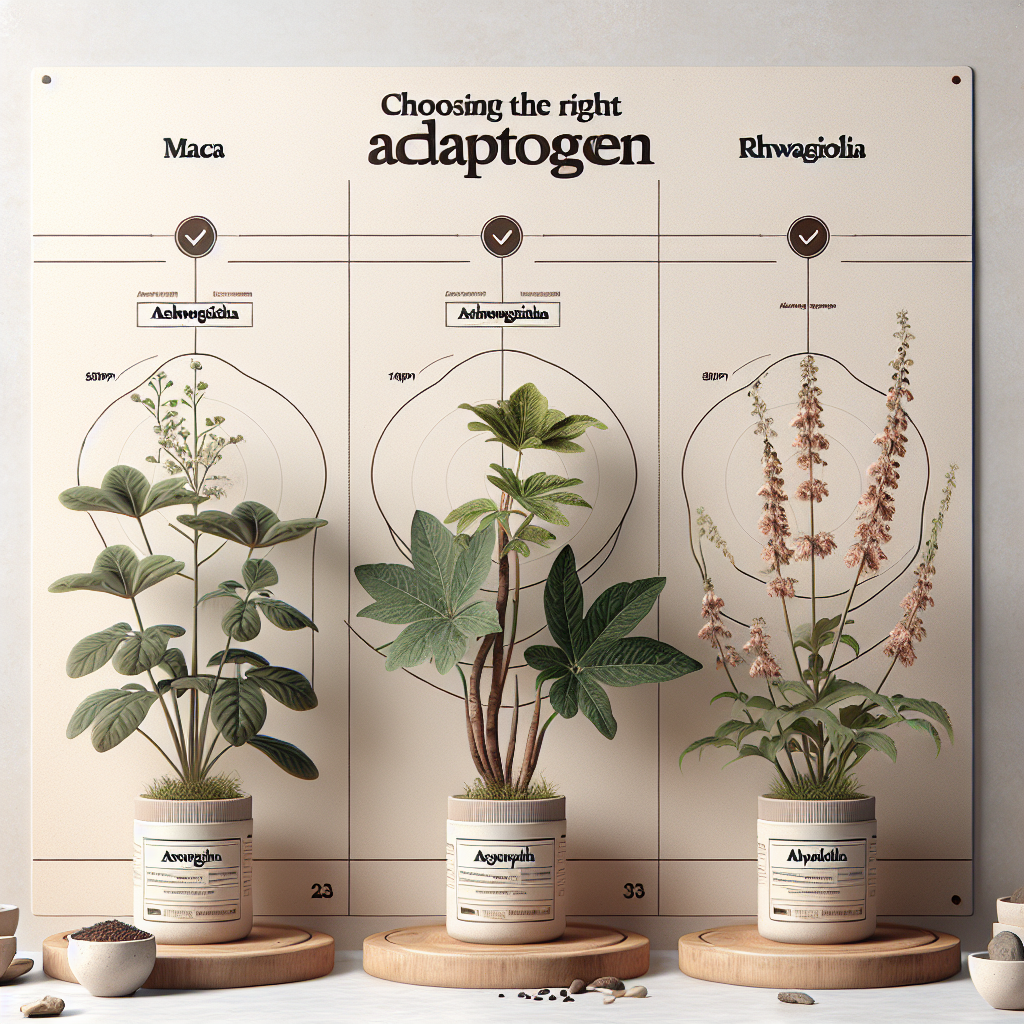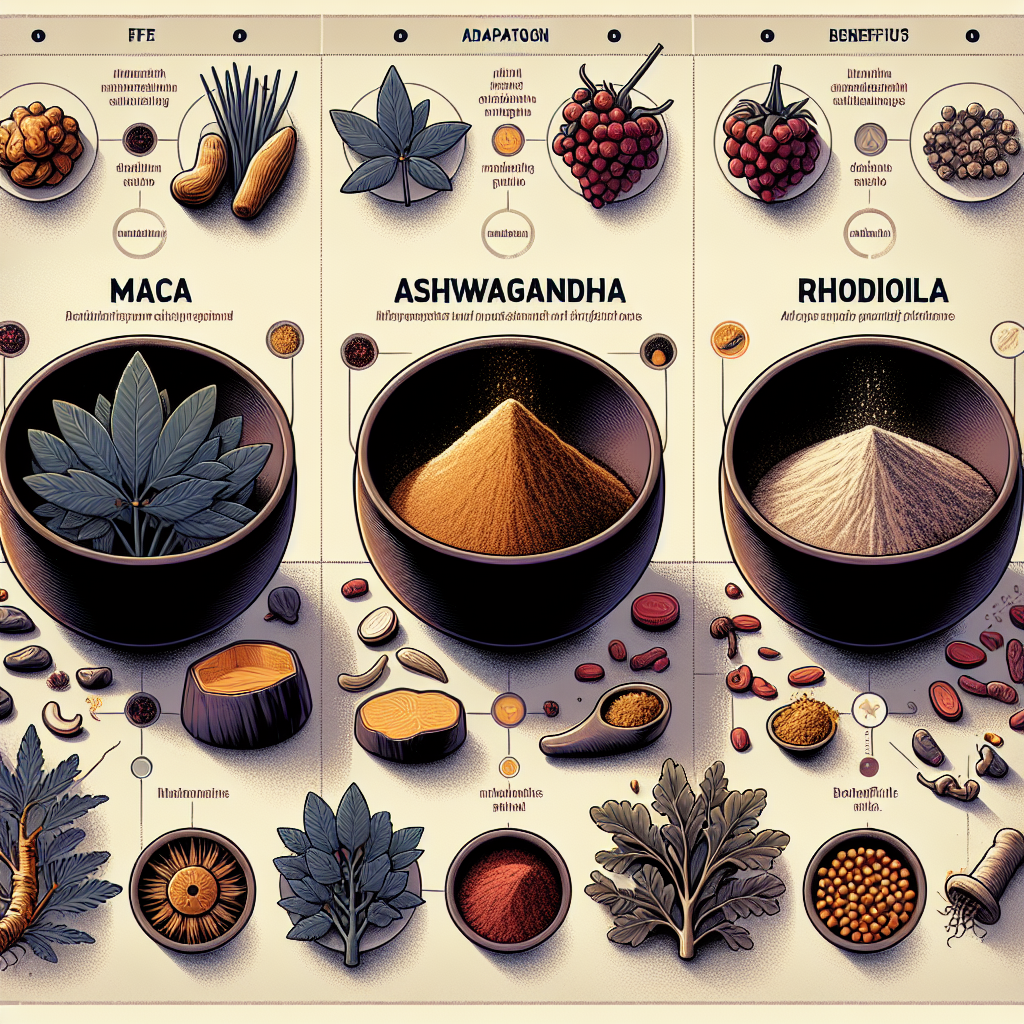Maca, Ashwagandha, and Rhodiola: Choosing the Right Adaptogen

Discover the power of Maca, Ashwagandha, and Rhodiola and learn how to choose the right adaptogen for your needs. Visit My Vibrant Vitality now to start your journey towards better health.
Comparing the Health Benefits: Maca, Ashwagandha, and Rhodiola
Adaptogens, a class of herbs and mushrooms that help the body adapt to stress, have been used for centuries in traditional medicine. Among the most popular are Maca, Ashwagandha, and Rhodiola. Each of these adaptogens offers unique health benefits, and understanding these can help you choose the right one for your needs.
Maca, a root native to the Andes Mountains, is often referred to as the “Peruvian ginseng.” It is renowned for its ability to enhance energy, stamina, and athletic performance. Moreover, it is believed to improve fertility and sexual health, making it a popular choice for those seeking to boost their reproductive health. Maca is also rich in essential minerals like zinc, iron, and calcium, and vitamins B, C, and E, contributing to overall wellness.
Transitioning to Ashwagandha, this adaptogen hails from India and is a cornerstone of Ayurvedic medicine. It is particularly known for its stress-reducing properties. Studies have shown that Ashwagandha can lower cortisol levels, the body’s primary stress hormone. This makes it an excellent choice for those dealing with chronic stress or anxiety. Additionally, Ashwagandha has been linked to improved brain function, including memory, reaction time, and the ability to perform tasks. It also has potential benefits for heart health, as it may lower cholesterol and triglyceride levels.
Lastly, we have Rhodiola, a herb that grows in the cold, mountainous regions of Europe and Asia. Its primary health benefit is its ability to help the body adapt to physical, chemical, and environmental stress. Rhodiola is often used by athletes to improve their physical performance and shorten recovery time after strenuous workouts. Furthermore, it has been found to have significant effects on mental fatigue, depression, and anxiety. Rhodiola is also believed to improve cognitive function, particularly concentration and memory.
While all three adaptogens offer impressive health benefits, it’s essential to consider your specific needs when choosing between Maca, Ashwagandha, and Rhodiola. If you’re looking to enhance physical performance or boost reproductive health, Maca might be the best choice. On the other hand, if you’re dealing with chronic stress or want to improve brain function, Ashwagandha could be more suitable. And if you’re seeking to combat mental fatigue or enhance cognitive function, Rhodiola might be the adaptogen for you.
However, it’s important to remember that while adaptogens can support health, they are not a cure-all. They should be used as part of a balanced lifestyle that includes a healthy diet, regular exercise, and adequate sleep. It’s also recommended to consult with a healthcare professional before starting any new supplement regimen, especially if you have underlying health conditions or are taking other medications.
In conclusion, Maca, Ashwagandha, and Rhodiola each offer unique health benefits that can support your body in dealing with stress. By understanding these benefits, you can make an informed decision about which adaptogen is right for you. Whether you’re seeking to enhance physical performance, reduce stress, or improve cognitive function, these powerful herbs can be a valuable addition to your wellness routine.
How to Choose the Right Adaptogen: A Guide on Maca, Ashwagandha, and Rhodiola

Adaptogens, a class of herbs and mushrooms that help the body adapt to stress, have been used for centuries in Ayurvedic and Chinese medicine. Among the most popular adaptogens are Maca, Ashwagandha, and Rhodiola. Each of these has unique properties and benefits, making it essential to understand their differences to choose the right one for your needs.
Maca, a root native to Peru, is often referred to as the “Peruvian ginseng.” It is renowned for its ability to enhance energy, stamina, and athletic performance. Moreover, it is believed to improve fertility and sexual health, making it a popular choice for those seeking to boost their reproductive health. However, it’s important to note that Maca is a stimulant, and as such, it may not be suitable for individuals with certain health conditions, such as heart disease or high blood pressure.
On the other hand, Ashwagandha, a cornerstone of Ayurvedic medicine, is known for its calming effects. It is often used to reduce stress and anxiety, improve sleep, and enhance mood. Unlike Maca, Ashwagandha is not a stimulant, making it a better choice for those seeking to relax and unwind. Additionally, it has been shown to support thyroid function, making it a beneficial supplement for individuals with thyroid disorders.
Lastly, Rhodiola, a plant native to the Arctic regions, is celebrated for its ability to combat fatigue and enhance mental performance. It is often used by students and professionals to improve focus and concentration. Furthermore, Rhodiola has been shown to have antidepressant properties, making it a potential natural remedy for individuals with depression.
When choosing between Maca, Ashwagandha, and Rhodiola, it’s crucial to consider your specific needs and health conditions. If you’re looking for an energy boost and improved physical performance, Maca may be the right choice for you. However, if you’re dealing with stress, anxiety, or sleep issues, Ashwagandha could be more beneficial. And if you’re seeking to enhance your mental performance or combat depression, Rhodiola may be the best fit.
It’s also important to consider potential side effects and interactions. While adaptogens are generally safe for most people, they can interact with certain medications and may not be suitable for individuals with specific health conditions. Therefore, it’s always recommended to consult with a healthcare provider before starting any new supplement regimen.
Moreover, the quality of the adaptogen is another crucial factor to consider. Not all supplements are created equal, and it’s essential to choose a product that is organic, non-GMO, and free from fillers and additives. This ensures that you’re getting the most out of your supplement and not exposing your body to unnecessary chemicals.
In conclusion, Maca, Ashwagandha, and Rhodiola each offer unique benefits, and the right choice depends on your specific needs and health conditions. By understanding their differences and consulting with a healthcare provider, you can make an informed decision and choose the adaptogen that is best suited for you.
Understanding the Differences: Maca vs Ashwagandha vs Rhodiola
Adaptogens, a class of herbs and roots renowned for their potential to help the body resist stressors of all kinds, have been used for centuries in traditional medicine. Among the most popular adaptogens are Maca, Ashwagandha, and Rhodiola. Each of these has unique properties and benefits, making it essential to understand their differences before choosing the right one for your needs.
Maca, a plant native to Peru, is often referred to as “Peruvian ginseng” due to its similar adaptogenic properties. It is rich in essential minerals like zinc, iron, and calcium, and is known for its potential to enhance energy, stamina, and mood. Maca is often consumed in powder form and has a slightly sweet, nutty taste, making it a popular addition to smoothies and baked goods. However, it’s important to note that while Maca may boost energy levels, it does not directly affect the body’s stress response system.
On the other hand, Ashwagandha, a cornerstone of Ayurvedic medicine, is revered for its potential to reduce stress and anxiety. It is believed to do this by regulating chemical signaling in the nervous system. Ashwagandha is also thought to improve concentration and increase energy levels, but unlike Maca, it directly influences the body’s stress response system. It is typically consumed in capsule form or as a powder mixed into warm milk or tea. Its flavor is more on the bitter side, which may not appeal to everyone.
Lastly, Rhodiola, a plant that grows in the cold, mountainous regions of Europe and Asia, is often used to combat fatigue and improve mental performance. It is believed to work by enhancing the body’s resistance to stress, thereby increasing energy levels and mental capacity. Rhodiola is typically consumed in capsule or tablet form, and unlike Maca and Ashwagandha, it does not have a strong taste.
In comparing these three adaptogens, it becomes clear that while they all offer potential benefits, their effects can vary significantly. Maca may be the best choice for those seeking to boost energy and mood, while Ashwagandha might be more suitable for those dealing with stress and anxiety. Rhodiola could be the ideal option for those looking to combat fatigue and enhance mental performance.
However, it’s crucial to remember that while these adaptogens can offer potential health benefits, they are not a substitute for a balanced diet, regular exercise, and adequate sleep. It’s also important to consult with a healthcare professional before starting any new supplement regimen, especially for those with underlying health conditions or those who are pregnant or breastfeeding.
In conclusion, Maca, Ashwagandha, and Rhodiola each offer unique benefits as adaptogens. Understanding their differences can help you make an informed decision about which one might be the best fit for your needs. Whether you’re looking to boost your energy levels, reduce stress, or improve mental performance, these adaptogens could potentially offer a natural solution. However, always remember to use them as part of a balanced lifestyle and under the guidance of a healthcare professional.